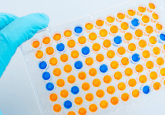New sensor to provide real-time electrolyte monitoring

A group of researchers have published work on a novel device that uses hollow polymer microneedles to offer a non-invasive method for analyzing electrolyte levels.
The hollow microneedles are made using lasers and integrated within a microfluidic chip. The device samples interstitial fluid – the liquid between cells – and has potential in diagnostic, as well as treatment, applications.
The device described by the research team, headed by Ronen Polsky (Sandia National Laboratories, NM, USA), measures levels of potassium. The needles sample interstitial fluid, with potassium ions then passing through the pores of the needle into a fluidic cartridge that contains carbon electrodes.
The team explained how this system could easily be adapted to measure other important electrolytes, by altering the selectivity of the carbon electrodes. In this way, the team envisages that one device could monitor various electrolytes in real time.
Looking to the future, the researchers also talk about a ‘sense-respond’ device – that would both measure levels of electrolytes, while also administering deficient electrolytes to the user. Since the device uses microneedles, and only takes a minute volume of fluid, it has potential for continual use.
The study presents a collaboration between Sandia National Laboratories (NM, USA) and the University of North Carolina and North Carolina State University (NC, USA) and is published in a recent issue of Advanced Healthcare Materials.
Source: Miller PR, Xiao X, Brener I, Burckel DB, Narayan R, Polsky R. Diagnostic devices: microneedle-based transdermal sensor for on-chip potentiometric determination of K+. Adv. Healthcare Mater. 3(6), 948 (2014).






